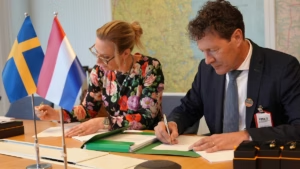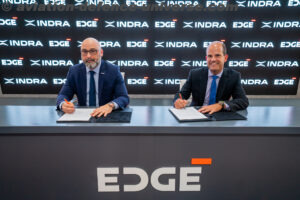- The study on AI presented by the University of A Coruña, the Spanish Navy and Indra at the DESEi+d Congress has been chosen as the best among 140 papers and recently published
- It is based on the SOPRENE Project, funded by the Directorate-General for Armament and Material – Sub-Directorate-General for Planning, Technology and Innovation (DGAM-PLATIN), working in conjunction with CESADAR to develop an advanced system for the maintenance of latest generation vessels
Madrid. 18 February 2021. The research paper on Artificial Intelligence developed by Indra together with the Spanish Navy’s Data Analysis and Monitoring Center (CESADAR in its Spanish initials) and the University of A Coruña was highlighted in the VIII National Congress for R&D in Defence & Security (DESEi+d in its Spanish initials) event as the best of all of the articles presented.
Of the 140 papers accepted, the one prepared by these three partners aroused the most interest among members of the Congress Committee for its level of innovation, and it decided to publish it to share it with the scientific community.
Under the title “Predictive maintenance of vessel engines through automatic learning”, the document analyzes the use of new artificial intelligence techniques to detect engine malfunctions even before they occur. The main author of the paper is David Novoa, a researcher at the University of A Coruña, together with his Master’s degree supervisors, Carlos Eiras and Oscar Fontenla, with support from CESADAR’s Official Technician, Lieutenant Francisco Lamas and Dr. David Sanz from Indra.
This paper is derived from the R&D+i SOPRENE project, funded by the Directorate-General for Armament and Material – Sub-Directorate-General for Planning, Technology and Innovation (DGAM-PLATIN, in its Spanish initials). Indra developed this project together with the Universities of Alcalá de Henares and A Coruña at CESADAR, the Spanish Navy’s leading authority in the use of predictive techniques in discovering mechanical failures and which promoted and led the technical side of the work, taking advantage of the data stored in its facilities in Cartagena.
Within the framework of the SOPRENE project, a technological demonstrator that enables predictive maintenance in vessels was successfully tested. It is a unique solution that combines deep learning, predictive and diagnostic algorithms and which stands out for its use of ‘unsupervised’ intelligence.
This kind of intelligence offers great potential, as unlike supervised AI, it uses a strategy focused on teaching machines to ‘learn how to detect and solve problems’, without needing to have prior knowledge. This makes it easier to use with platforms, systems or equipment that are very different from one another and enables unrecorded errors and ones that have never occurred before to be detected, something in which it differs from a conventional AI system.
This last characteristic is the one that has made SOPRENE the best solution available to maintain latest generation vessels which have yet to go to sea. Similarly, when combined with the predictive algorithms which have also been developed, it is able to detect the most serious faults in advance, including those that have never occurred before and which, if they were left unresolved, could put the crew at risk.
The number of applications offered by this technology is huge. In the military field, it can be used to maintain the equipment and platforms of any of the three armed forces, while in the civilian field, it can improve the maintenance of all types of industrial equipment. For example, maintenance costs can account for up to 60% of total production costs in the metallurgical industry.




































































































































